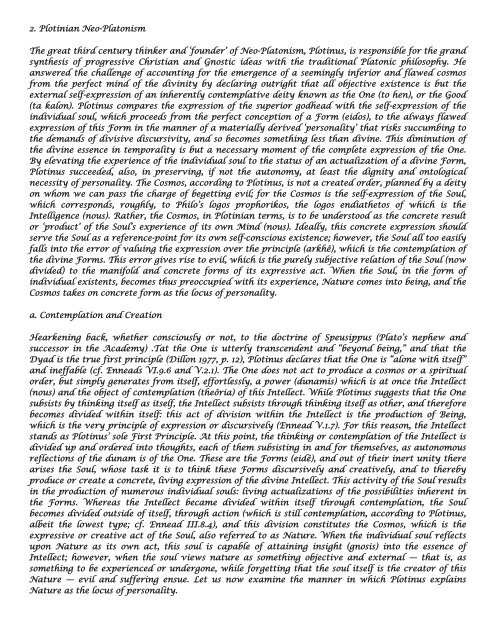Neo-Platonism - Grand Lodge Bet-El
Neo-Platonism - Grand Lodge Bet-El
Neo-Platonism - Grand Lodge Bet-El
You also want an ePaper? Increase the reach of your titles
YUMPU automatically turns print PDFs into web optimized ePapers that Google loves.
2. Plotinian <strong>Neo</strong>-<strong>Platonism</strong><br />
The great third century thinker and ‘founder’ of <strong>Neo</strong>-<strong>Platonism</strong>, Plotinus, is responsible for the grand<br />
synthesis of progressive Christian and Gnostic ideas with the traditional Platonic philosophy. He<br />
answered the challenge of accounting for the emergence of a seemingly inferior and flawed cosmos<br />
from the perfect mind of the divinity by declaring outright that all objective existence is but the<br />
external self-expression of an inherently contemplative deity known as the One (to hen), or the Good<br />
(ta kalon). Plotinus compares the expression of the superior godhead with the self-expression of the<br />
individual soul, which proceeds from the perfect conception of a Form (eidos), to the always flawed<br />
expression of this Form in the manner of a materially derived ‘personality’ that risks succumbing to<br />
the demands of divisive discursivity, and so becomes something less than divine. This diminution of<br />
the divine essence in temporality is but a necessary moment of the complete expression of the One.<br />
By elevating the experience of the individual soul to the status of an actualization of a divine Form,<br />
Plotinus succeeded, also, in preserving, if not the autonomy, at least the dignity and ontological<br />
necessity of personality. The Cosmos, according to Plotinus, is not a created order, planned by a deity<br />
on whom we can pass the charge of begetting evil; for the Cosmos is the self-expression of the Soul,<br />
which corresponds, roughly, to Philo’s logos prophorikos, the logos endiathetos of which is the<br />
Intelligence (nous). Rather, the Cosmos, in Plotinian terms, is to be understood as the concrete result<br />
or ‘product’ of the Soul’s experience of its own Mind (nous). Ideally, this concrete expression should<br />
serve the Soul as a reference-point for its own self-conscious existence; however, the Soul all too easily<br />
falls into the error of valuing the expression over the principle (arkhê), which is the contemplation of<br />
the divine Forms. This error gives rise to evil, which is the purely subjective relation of the Soul (now<br />
divided) to the manifold and concrete forms of its expressive act. When the Soul, in the form of<br />
individual existents, becomes thus preoccupied with its experience, Nature comes into being, and the<br />
Cosmos takes on concrete form as the locus of personality.<br />
a. Contemplation and Creation<br />
Hearkening back, whether consciously or not, to the doctrine of Speusippus (Plato’s nephew and<br />
successor in the Academy) .Tat the One is utterly transcendent and “beyond being,” and that the<br />
Dyad is the true first principle (Dillon 1977, p. 12), Plotinus declares that the One is “alone with itself”<br />
and ineffable (cf. Enneads VI.9.6 and V.2.1). The One does not act to produce a cosmos or a spiritual<br />
order, but simply generates from itself, effortlessly, a power (dunamis) which is at once the Intellect<br />
(nous) and the object of contemplation (theôria) of this Intellect. While Plotinus suggests that the One<br />
subsists by thinking itself as itself, the Intellect subsists through thinking itself as other, and therefore<br />
becomes divided within itself: this act of division within the Intellect is the production of Being,<br />
which is the very principle of expression or discursively (Ennead V.1.7). For this reason, the Intellect<br />
stands as Plotinus’ sole First Principle. At this point, the thinking or contemplation of the Intellect is<br />
divided up and ordered into thoughts, each of them subsisting in and for themselves, as autonomous<br />
reflections of the dunam is of the One. These are the Forms (eidê), and out of their inert unity there<br />
arises the Soul, whose task it is to think these Forms discursively and creatively, and to thereby<br />
produce or create a concrete, living expression of the divine Intellect. This activity of the Soul results<br />
in the production of numerous individual souls: living actualizations of the possibilities inherent in<br />
the Forms. Whereas the Intellect became divided within itself through contemplation, the Soul<br />
becomes divided outside of itself, through action (which is still contemplation, according to Plotinus,<br />
albeit the lowest type; cf. Ennead III.8.4), and this division constitutes the Cosmos, which is the<br />
expressive or creative act of the Soul, also referred to as Nature. When the individual soul reflects<br />
upon Nature as its own act, this soul is capable of attaining insight (gnosis) into the essence of<br />
Intellect; however, when the soul views nature as something objective and external — that is, as<br />
something to be experienced or undergone, while forgetting that the soul itself is the creator of this<br />
Nature — evil and suffering ensue. Let us now examine the manner in which Plotinus explains<br />
Nature as the locus of personality.
















